All along, anyone who knows that I am learning Japanese always asks me one question: How did you learn Japanese?
Me: Self-study...
So today I am writing this content to summarize the reasons, process, and some tips for my Japanese learning.
First of all, I want to declare that my Japanese is not good; I have only passed the N2 level. So if any of the big shots among you cute ones see this content, feel free to correct and add.
First, let’s talk about my motivation for learning Japanese.
When I was young, I liked watching three anime (back then, they were probably still called cartoons. Ahem... exposing my age):
- Detective Conan
- Doraemon
- Cardcaptor Sakura (the original magical girl)
Of course, at that time, the internet was not very developed. Although I liked to mess around on the computer since I was little, I only watched some live broadcasts of Doraemon on PPS Video (I wonder if many people still know about this now. Later, it merged with Tudou and I stopped using it, then it was acquired by Baidu...)
Whether it was on TV or the live broadcasts of Doraemon, they were all dubbed in Mandarin (probably the Taiwanese version), so at that time, I just enjoyed watching these three anime.
Later, as the internet developed a bit, I started watching Conan and Doraemon on Youku, and it was at this time that I suddenly discovered two interesting things.
Conan could be watched in both Japanese and Chinese, while Doraemon had a collection called New Episodes (at that time, I knew nothing about anime or series), so I started watching the original version of Conan, and the new episodes of Doraemon were also in Japanese.
Of course, when I first encountered it, I couldn't understand anything, but I found it very interesting, and I felt that the tone and feeling of the speech were very pleasant (I probably just thought it was very cute).
Thus, without any intention to learn, I watched the original versions of Conan and Doraemon (both with Chinese subtitles) for two years (probably?).
In the third year of middle school, completely unaware of any anime other than the three mentioned above (of course, I didn't know about Bilibili, let alone topics like resources), one day while chatting with classmates in the classroom, a classmate came over to ask me for something, and without thinking, I blurted out ちょっとまって, which means "wait a moment" in Japanese. This sentence happened to be heard by a classmate behind me, who was surprised and thought I was also an お宅 (otaku).
Of course, I knew nothing at the time. Looking back, that person must have really been an otaku and a bit of a chuunibyou (laughs). I kept thinking how great it would have been if I had known or been introduced to the concepts of Bilibili and anime back then.
So after graduating from middle school, I still knew nothing about these two concepts. During the summer vacation, I continued to watch Conan and Doraemon, and thanks to this summer vacation, I rewatched the Japanese version of Conan from the beginning.
I found that I gradually began to understand the dialogues in Doraemon, although I didn't understand everything, but even without looking at the subtitles, just watching the plot and listening to the dialogues, I could guess most of it correctly.
I suddenly felt very impressive that I could understand Japanese, and I could also say some simple daily expressions!
- ちょっとまって
- 君
- 友達
- 死ね
- よし
- いいよ
- はい
- すごい
- 本当に
- 好き
I could say these things fluently.
Thus, I entered high school, and in my first year, I immediately came into contact with a group of classmates who liked anime.
After their recommendations, I registered on Bilibili and began to delve deeper into the world of otaku.
The first anime I learned about was probably Assassination Classroom, although when I first watched it, I was completely confused. Did they really just point a gun at the teacher during roll call???
What kind of terrifying thing did my classmates recommend to me?
With this thought, I finished watching the first episode. I found that although I couldn't understand why the plot developed this way, I didn't dislike it, and the characters in anime could be so cute.
At that time, this anime was just finishing up, so I didn't experience the pain of waiting for new episodes.
Back then, the Bilibili mobile app allowed direct downloads of anime and converted them into mp4 format. After doing this, I would use my phone to cast these anime to the big TV at home using DLNA technology, watching them alone when no one was around, which felt very satisfying, reminiscent of my childhood days spent in front of the TV watching anime.
Moreover, I didn't think the bullet comments were very interesting; I even found them quite annoying because they affected my viewing experience.
Ahem... getting off track.
After watching these recommended anime, my daily conversations with my classmates gradually increased, and many times they revolved around anime.
So one day, without realizing it, I ended up discussing Japanese with a classmate. The classmate said they wanted to learn Japanese and were currently memorizing the hiragana chart, which was a blind spot in my knowledge. Hiragana chart? What is that? Can you eat it?
That night, after returning home, I immediately opened my computer and searched for the 50 sounds chart, only to see a bunch of symbols I had never seen before. What are these? [manual facepalm.jpg]
I immediately lost my motivation, but I accidentally came across two things.
One was an advertisement for a Japanese course recommended by X, which I seemed to have registered for but never used. Much later, I received an advertisement text message from X, but that’s a story for another time.
The other was a document called 100 Basic Daily Japanese Phrases from X's library (back then, it was still free to download, the evil capitalism), I downloaded it and printed it out (I went to a stationery store at the school gate to print it, and it cost me 5 yuan, so expensive!!!). This was probably my very first Japanese textbook.
I can still find this today.
Then, I would take that printed document to school every day and look at it whenever I had free time, but it took a long time for me to remember the first page.
After finding this document, I sent the electronic version to the cute girl who recommended me Assassination Classroom because she also wanted to learn Japanese.
As a result, during high school, the only thing I remembered about learning Japanese was just a part of this document, and most of the daily spoken expressions were still memorized through anime.
In a situation where I couldn't understand the kana at all, I opened the Japanese romaji input method that came with my phone. I couldn't understand kana, but I could understand romaji, right? So I often used this input method to send the Japanese I had prepared in advance as kana to that girl, chatting in this way.
After seeing the kana I sent, she would refer to the hiragana chart in her hand to translate it into the corresponding pronunciation for understanding.
This process lasted for about a year, and I found that I still didn't know anything.
At this point, the idea of learning Japanese had faded.
The most I did was to feel pleased for a moment when I heard familiar expressions while watching anime...
Later, I entered my second year of high school and met someone very important to me. This person taught me the concept of moe, which influenced many things in my future, including the current moe domain suffix.
Thus, I began to like all kinds of cute things (which means moe things).

So, I graduated from high school. Although I made no progress in Japanese, thanks to the recommendations from my classmates in the first year, I had already become a die-hard fan, and my exposure to different types of anime increased, along with my knowledge about anime and Japanese.
During the summer vacation, I began to plan for the university I was about to enter, and the first thing was to start formally learning Japanese. My goal at that time was very simple: to learn the hiragana chart and master simple daily conversations.
Thus, I spent a very pleasant summer vacation (because there was no homework and nothing to do), watching a lot of anime and self-studying C language programming...
Upon entering university, the first thing was military training.
Oops! I hate it.
On the third night of military training, without evening training, I finished a day of training tasks at seven o'clock for the first time and stepped into the library, which was very far from the dormitory.
Upon entering the library, I searched for the keyword Japanese on the self-service search machine and found a book called 《My First Japanese 50 Sounds》 by Yumi Yoshimatsu.
Then I went to a stationery store very close to the dormitory and bought a cute notebook and a pen.
From that day on, I began to study Japanese seriously.
Every night at 9 o'clock after military training, I would shower and change, then return to the dormitory to copy and memorize two or three lines of the hiragana chart, including kana, romaji, and example words, copying one page for each line.
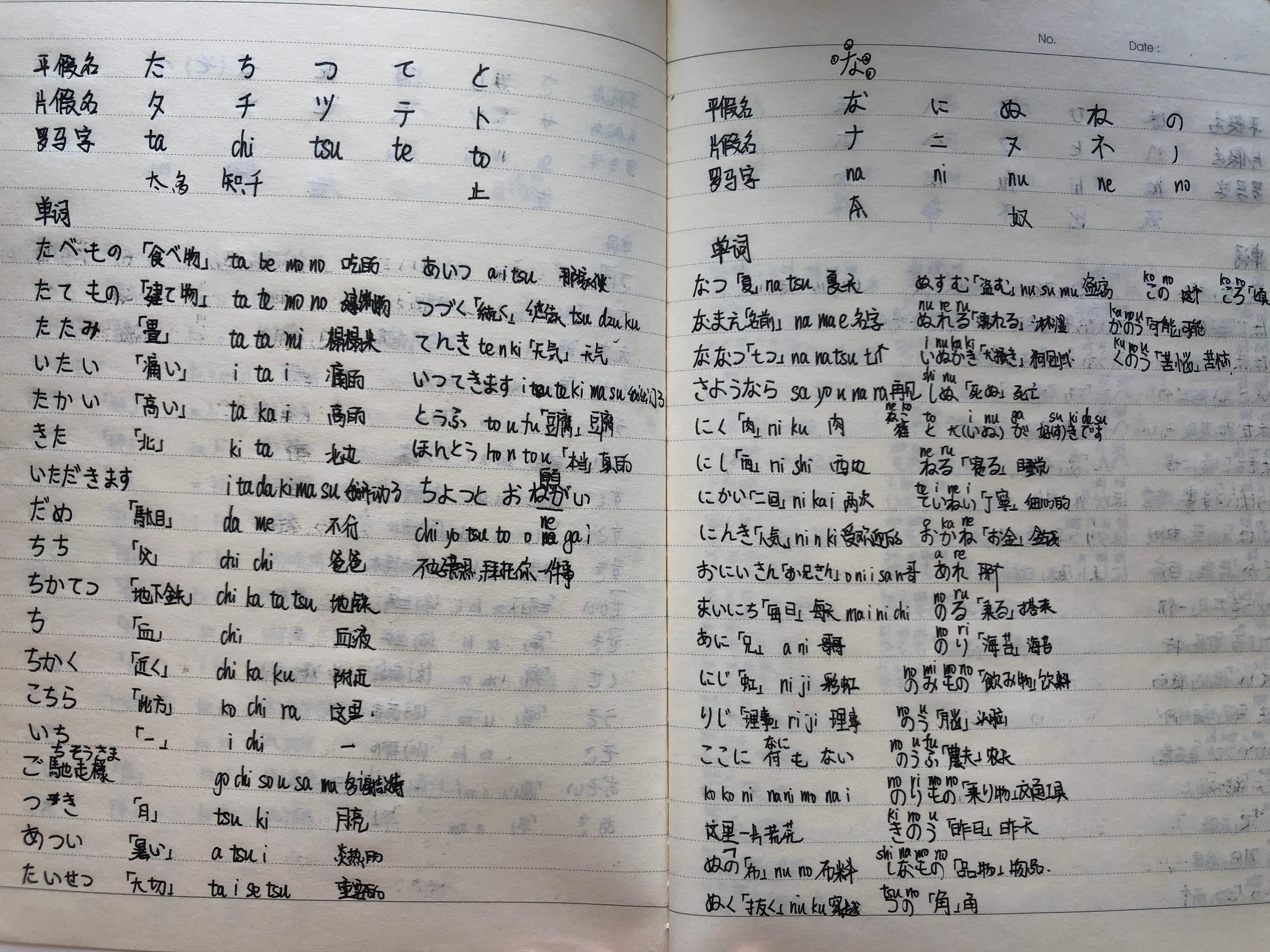
Little by little, I finished the hiragana part and began to learn the katakana part in the same way.
I managed to remember the hiragana with some difficulty, but I hardly remembered the katakana; after going through it once, it seemed that not much stayed in my memory.
Thus, military training ended.
University classes began, and one day during a break in a calculus class, two people came in, one probably around college age and the other probably a professor's age.
The college student said something that delayed everyone for a few minutes, then began to fluently speak a lot in Japanese.
With my anime foundation, I could almost understand what they were saying, which was roughly: Hello everyone, nice to meet you, I am a junior here, and I would like to introduce our Japanese course to you. There are many benefits to learning Japanese; you can understand anime, watch raw episodes, follow idols, sing Japanese songs, etc. Speaking Japanese is tiring, so please let me continue in Chinese. (The above content is translated from Japanese--by rtmacha)
Then they started promoting their Japanese course, and I was very interested, so I asked for a registration form to fill out.
They also said that learning Japanese could be used for the Japanese language entrance exam and the CET-4/6, so I wouldn't have to take English.
For someone who doesn't really like English, this was definitely a great opportunity.
So, during the trial class, a large group of us (not just from the calculus class) were gathered in a classroom in a teaching building, where they taught us the basics of kana for about an hour, then started promoting their textbooks and trial classes, saying that instead of 999, for just 9.9, you could have our basic Japanese course and our exclusive Japanese textbooks.
So, I, along with my middle school best friend and my roommate X, paid the fee and registered, finishing the trial class.
Thus, on the first day of formal classes, we, a large group of registered students, entered their classroom and experienced a wonderful Japanese environment for the first time.
However, what they taught was the Japanese kana, which was the content I had self-studied during military training. With the mindset of not wanting to waste it and the freshness of having a teacher for the first time, I persisted, while the other two friends I dragged along only lasted until the third day before they stopped coming.
This was a class after finishing the hiragana, where we learned our first Japanese song?
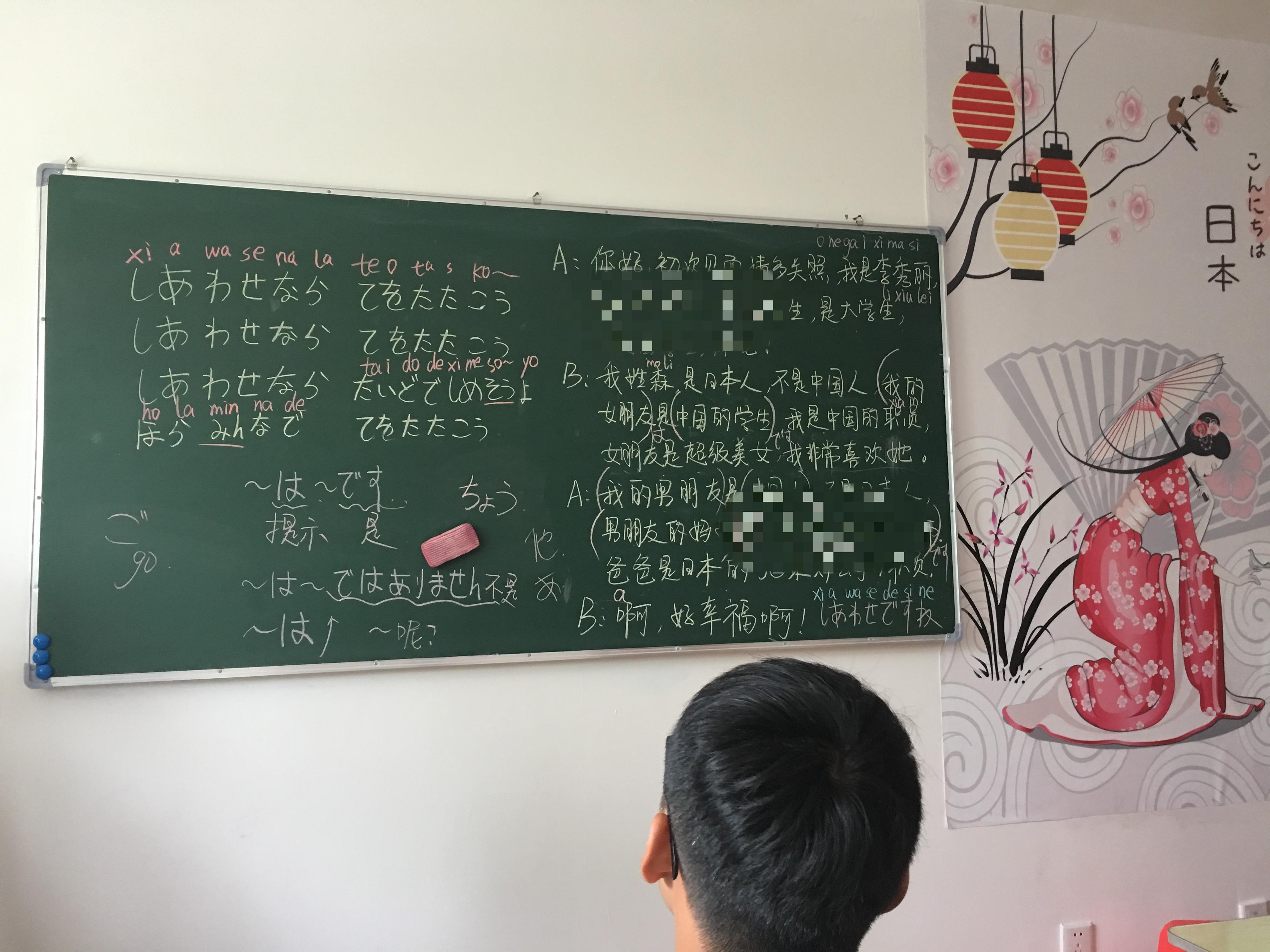
I only have this one photo as a record of that classroom.
The last class, due to my schedule, was a makeup class, which turned into a one-on-one session.
After telling the teacher that I had already learned the kana, the teacher began to talk to me about other content.
After understanding this content, I inquired about the teaching materials for the formal course, and the teacher recommended the textbook Standard Japanese.
Faced with the thousands of yuan registration fee, I hesitated. I first learned that studying knowledge could cost so much money.
Back in the dormitory, I opened X East, bought books, and self-studied.
Thus, I began my self-study time for Japanese.
During this period, the school had an event, the content of which I forgot, but in the end, there was a boy playing the flute who played a song called Secret Base. I didn't know what this song was at the time; I just thought it was very beautiful and even felt a sense of déjà vu.
Because I had previously skipped all the OPs and EDs of anime, thinking they wasted time.
Later, after my classmates told me, I realized that I had missed out on so many treasures.
So, with this opportunity, I decided to learn to sing this song, which was the first Japanese song I learned.
I used the time when I didn't have classes to study the first volume of Standard Japanese in my dormitory, but it was intermittent; sometimes it could take several days to learn one lesson, and with exams and programming overlapping, I was almost ready to give up studying.
A year passed like this, and at the end of my freshman year summer vacation, I got an opportunity to go to Japan. However, at this time, my Japanese level had barely improved beyond recognizing hiragana and katakana and some vocabulary and grammar.
After learning this news, I quickly studied the remaining content of the first volume of Standard Japanese, but due to the proximity of the news and the departure date, I ultimately did not complete the study of this book.
Thus, I went to Japan with less than N5 level.
Sure enough, the consequence of not studying seriously is not good. Although I had watched anime for so many years and didn't worry about listening comprehension, I couldn't express myself [facepalm]...
The flight I took had a layover in South Korea, all on Korean Air, but it was two separate flights. As a foreigner entering another country, I had to fill out something called an entry card. I received this card on the flight to Korea, and I called the crew to ask if I needed to fill it out for just a layover.
As a result... the entire crew had no one who spoke Chinese... I was instantly dumbfounded.
Because of learning Japanese, I hadn't used English for a year, and I had almost forgotten how to express myself in English... and I didn't know Japanese either... nor Korean...
After holding it in for a long time, I said, Should I fill this paper? But I didn't know how to express the transfer. It should be transit, but at that moment, I had no idea.
This time, it was their turn to be confused: You, a foreigner, are asking me if you need to fill it out??? (I guess)
······
I plan to write another piece about my experience in Japan; once it's done, I will update the link here.
······
In the end, relying solely on my less than N5 level of Japanese, I successfully spent a pleasant 10 days there. Additionally: I still want to visit Akihabara.
After returning, I became motivated and decided to start studying Japanese seriously because there were only a few days left before the new semester began. I used the remaining days of vacation and the first semester of my sophomore year and that winter vacation to finish the first and second volumes of Standard Japanese.
Thus, the second semester of my sophomore year began...
There was a classmate in my major who had registered for the Japanese course mentioned above during my freshman year, and as a result, they passed N2 in the first semester of their sophomore year.
Sometimes we would communicate in Japanese, but I was particularly poor at it; I could understand but my expression was still very lacking, so as we talked, I gave up.
After the semester started, he asked me how I was doing with my studies. After hearing that I had finished three books, he invited me to register for the JLPT in July of that year, but I was N2 and he was N1.
Without thinking, I refused for two reasons: one was that the registration fee was 450 yuan (the last batch before the price increase), and the second was that I had only learned so little, and it was too difficult; I didn't even dare to think about it.
After he had persuaded me for a long time, I decided to give it a try.
However, at the same time, I needed to take the English Level 6 exam, and I failed the first time.
With the mindset of giving up English and only studying Japanese, I began my journey of studying towards the N2 goal.
In search of methods, I found an article online.
Prepare for the exam in 3 months--N2
To the original author: Please forgive my unauthorized citation
After reading this content, I was very encouraged because it was almost the same as my situation; I only started preparing for the exam after registering. I decided to give it a try.
First, regarding textbooks, with the spirit of going all out, I bought the N2 part of the New Complete Mastery series of textbooks. I originally wanted to buy the whole set, but based on a suggestion from a YouTuber I particularly liked, Cold Water Boiling Instruments, I didn't buy the kanji book.
Here’s a display of my books. The red box on the right shows that there are so many textbooks behind it, but I was too lazy to organize them (I don't have a bookshelf, so I can only put them in the cabinet), and there are about 5-6 other textbooks elsewhere.
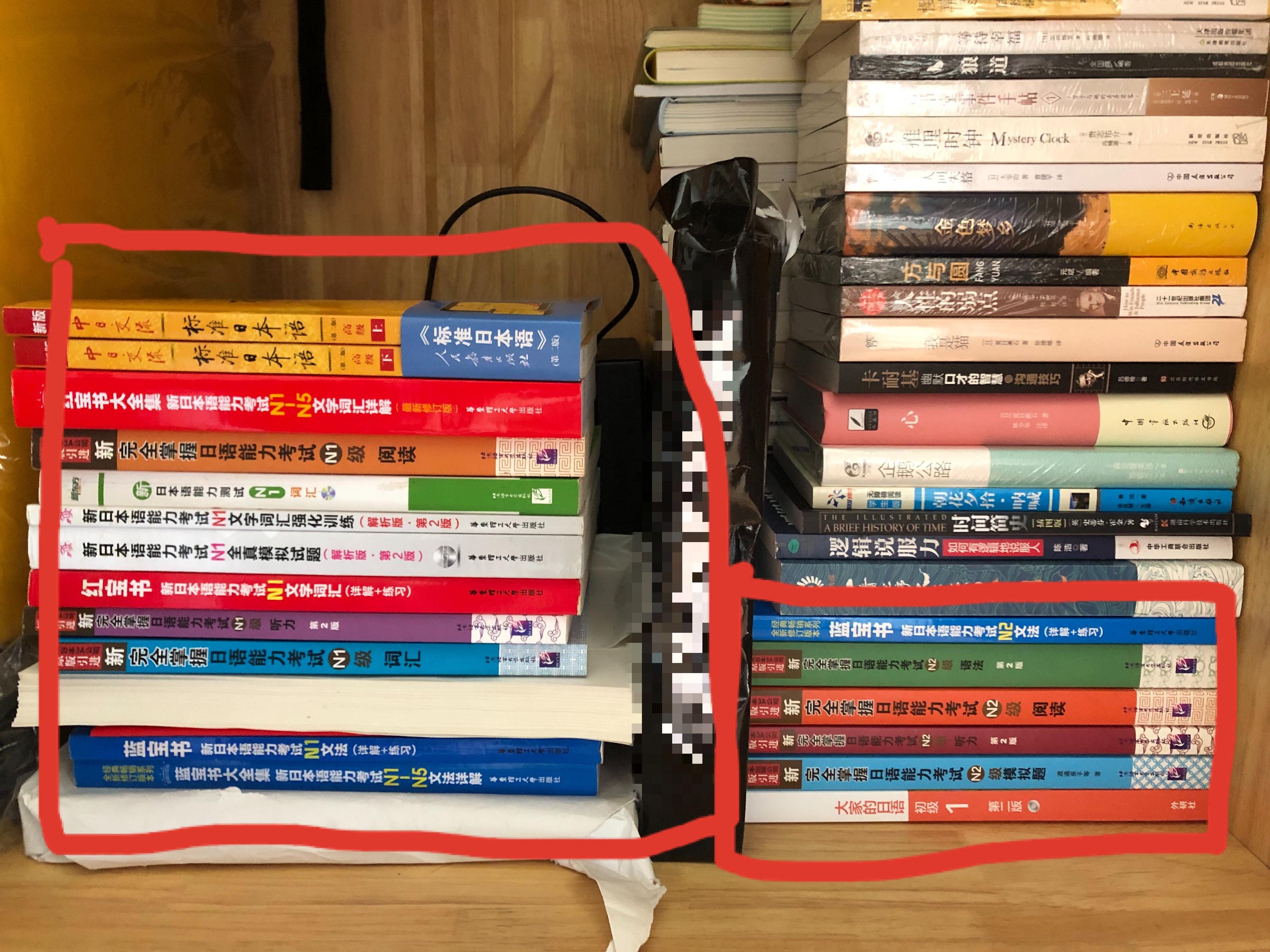
The white lump on the left is the N1 papers I bought, and the books on the right are the ones I am about to read (can be ignored).
Then it was just one word: study.
The rest was other content; I bought past exam papers from the omnipotent Taobao. This was recommended by that senior who has already passed N1.
Then, the content I listened to changed from Japanese songs to NHK Radio News, and I utilized every moment to listen to this to sharpen my ears, such as during my walk to class, while eating alone, pondering life, and even while brushing my teeth at night...
Although I had watched so many anime, I still couldn't understand when listening directly.
After a long time, I still couldn't understand the opening sentence, こんばんは、七時になりました、NHK今日のニュースです、まずは主な項目です。 (Is it roughly like this?)
By the way, while writing this content, I happened to be listening, and the current opening has changed to こんばんは、七時になりました、NHK今日のニュースです。今夜最初はコロナウィルス感染拡大が止まりません……
Well, just in time for this period, there’s nothing I can do.
If I can't understand, then I can't understand; I just keep listening. So I listened like this for about a month, and suddenly I found that I could roughly understand the content and could even slightly repeat it.
So I turned my claws towards... myself, and I opened the double-speed playback mode, which was another long torment.
In short, now I can easily understand NHK news at double speed. Congratulations, congratulations!
By the way, I highly recommend this, and if you use Apple's podcast, it's even more convenient.
If you are using an Apple device, you can directly click here to subscribe.
Additionally, for vocabulary, I used the X Jiang Happy Vocabulary mentioned earlier to finish memorizing the N2 words.
Every day when I memorized vocabulary, I would copy down the words and their Chinese meanings.
Please allow me to show off a bit.
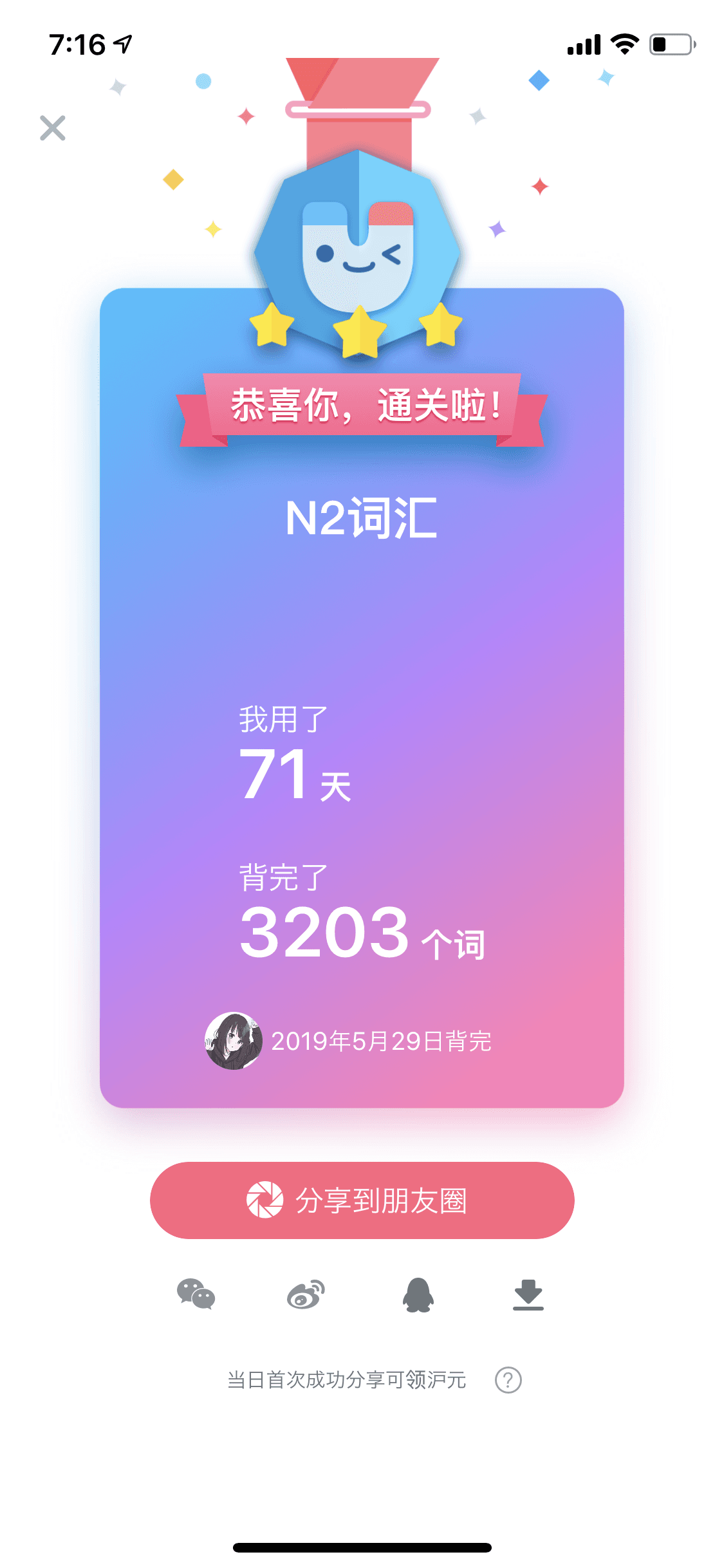
So I wrote half a notebook of vocabulary.
For grammar, I memorized it in the order of the textbooks I bought.
Thus, after finishing all the vocabulary and grammar, I found that after closing the book, I still wouldn't know anything. Although I could use my language sense to do it, I couldn't guarantee the accuracy of the entire team.
So I read that article again, and indeed, the gains were different from the first time I read it.
I followed the suggestions in that article, and in the last month, I copied all the grammar + 1-2 example sentences. Of course, it wasn't for memorization, just to go through it.
Using the other half of the vocabulary notebook, I copied all the grammar.
At that time, it was summer, and after class at 5 o'clock, I had my own time, so I moved my chair to the dormitory balcony and started memorizing. I wasn't allowed to eat until I finished. Additionally, around 7:30, it would get dark, so if I didn't finish that day, I wouldn't have dinner.
During this process, I really went hungry for a whole night.
Sometimes, after finally finishing, I would miss the dining hall's operating hours, and as a result, baked sweet potatoes became my lifesaver.
Before 8 o'clock, I would go to the dining hall, buy a piece of baked sweet potato that wasn't that hot anymore, return to the dormitory, put on my headphones to listen to NHK news, and eat that already cooled baked sweet potato, which was so sweet.
Of course, this method wasn't my original idea; I learned it from that YouTuber named Cold Water.
Thus, based on doing two or three complete sets of papers each week, I took the exam on July 7 (the day of Japan's Tanabata, how meaningful).
After finishing the exam that day, I felt like it was over... I definitely wouldn't pass.
Because in the grammar questions, there was a very basic pronunciation question, and it was an N5 vocabulary word that I forgot.
But thinking about it, I realized that my initial intention for registering for the exam was not necessarily to pass; I just wanted to try it and not leave any regrets.
Japanese, I would continue to learn as a hobby, and maybe one day in the future, if I have a job, I might take the N1 exam just to give it a try.
So, during the summer vacation, I continued to open the podcast and listen to NHK broadcasts.
By chance, I saw a push notification on WeChat from the Standard Japanese Uncle public account, which said: Since you have nothing to do, why not do an assignment? This summer vacation, memorize this content.
The article's title was Prime Minister Tanaka's Greeting at the Banquet Held in Response to the Prime Minister Zhou Enlai's Invitation.
After reading the article, I decided to start memorizing since I had nothing to do anyway.
So I seriously memorized for many days, and finally, several days after the full text was pushed, I memorized it. Here, I discovered many grammar and vocabulary usages I had never seen before.
From this article, I realized that I was still very far from proficient.
Moreover, after recording myself and repeatedly listening to what I said, I found that it was really terrible, especially my speed and pauses; it sounded quite subtle, and it might be better to say strange directly.
At this time, I remembered the spoken language course from XX Japanese that I had seen by chance before the exam, and I had previously attended a trial class. At that time, I wanted to express something but couldn't.
Should I try that course?
Coincidentally, a classmate who had learned Japanese before also took a spoken language course, and I asked them about it. The answer was neutral, meaning it wasn't that great.
But I still wanted to give it a try, possibly because I had prepared for the exam for so long but didn't do well. After a long time, I spent a significant amount of money, close to five digits in RMB, but I didn't have money, so I chose to use the education installment plan from their partnered X East and began a frugal life.
At this time, baked sweet potatoes returned to my daily routine (laughs).
By the way, I lost quite a bit of weight during this time. It turns out that learning Japanese can also help with weight loss (not really).
But it was really useful, and I am very grateful for that decision.
After every half-hour spoken language class, I felt like a complete wreck, not wanting to move at all, but that wasn't the most painful part.
The most painful part was during the review of recorded classes. I set a goal for myself to watch the replay and take notes afterward because I couldn't let such an expensive class go to waste.
Thus, during the review, my notes gradually turned into correcting my mistakes, recording the correct expressions, and transcribing every sentence the teacher said. It might take me 5-6 hours to do this for one video. I probably spent most of my spare time in the first semester of my junior year doing this.
After about 10 classes, I found that my speaking had indeed become a bit smoother.
Moreover, I surpassed that classmate who had passed N1!!!
After this, during Japanese conversations, I often found myself being asked how to express certain things.
For example, hey, what is that XX again?
はい、ストップ!
Here, I suddenly want to share two effective practice methods.
- Shadowing (シャドーイング)
Find an audio or video that is slightly faster than your comfortable speed, then listen and repeat, trying to match the speed within two or three words. Imitate the voice and intonation of the material as closely as possible. Even if you encounter difficult or unfamiliar words, don't pause; try to guess the meaning based on the context, and practice as a complete segment.
Afterward, you can try opening the subtitles (if there are no subtitles, try listening multiple times), and repeat while looking at the subtitles.
I personally prefer various videos on YouTube because YouTubers often speak quickly and may use some colloquial expressions.
Of course, I also enjoy watching Vtubers' live streams, which usually don't have Chinese subtitles. Bilibili may have simultaneous translation, but there is usually a delay. This way, there are more colloquial usages.
Even many popular phrases, like the currently trending タピオカ and ぴえん.
- Read the hiragana chart
This doesn't mean reading in the order of あいうえお、かきくけこ.
あらいりうるえれおろからきりくるけれころ
さらしりするせれそろ
たらちりつるてれとろ
ならにりぬるねれのろ
はらひりふるへれほろ
まらみりむるめれもろ
やらいりゆるえれよろ
ららりりるるれれろろ
わらいりうるえれをろ
This means inserting the sounds of the ra-row into each line of kana for connected reading.
If you find it difficult to read smoothly, that's normal; I practiced this for almost a year (I’m a bit slow).
I highly recommend these two practice methods.
Now, let’s continue with the story...
During the summer vacation before the first semester of my junior year, I went back to tidy up my dormitory in preparation for the new semester. This day was the day when the English Level 4 and 6 results were released.
With the mindset that I definitely wouldn't pass, I still opened the query interface and entered the two examination numbers one by one.
Guess what?
I passed the English Level 6, and with a high score (by the way, I failed the listening section the first time I took the English Level 6), and surprisingly, my listening score even exceeded my reading score, which I was best at.
As expected, I also passed the Japanese Level 4.
If you ask why I took the Japanese Level 4 exam, it was just to experience the exam environment before taking N2 (about a month apart) and to boost my confidence because the difficulty levels were quite different.
At that time, I forcibly dragged my boyfriend to school with me, so I was so happy that I directly hugged him, resulting in him being annoyed. w
Still during this summer vacation, but a bit earlier than the date above, I called my high school classmates to go to KTV together. I sang the Japanese songs I had learned and was praised by my boyfriend for singing well. w
Below are the lyrics I specifically brought to KTV.
Time passed painfully as I attended spoken language classes and painfully summarized and reviewed them.
The dormitory was certainly not a good place because, although it was September, it was still hot. So I took my computer and notebook to find an air-conditioned classroom on the top floor, staying there until the cleaning staff came to kick me out at night, reluctantly closing my computer and notebook to return to the dormitory, then taking out my favorite novels from the bookshelf to read.
Before sleeping, I would put on my headphones and listen to NHK news while brushing my teeth (even though I wasn't taking the Japanese exam anymore, this seemed to have become a habit).
By October (approximately), it was finally the day before the judgment day, and the registration for the December JLPT began. You read that right, the day before the results were released.
Actually, I had the thought that if I didn't pass this time, I would challenge N2 again, but I was also afraid that if I passed, I would regret paying the fee.
Of course, there is a way; after registering on the official website, the payment time is 24 hours, which means I could grab a spot first and then decide whether to register after checking the results. (Please try not to do this; it would cause trouble for those who genuinely need to take the exam.)
I also thought about it; regardless of whether I passed or not, I would directly register for N1 to give it a try, but I gave up on that idea. One reason was that it cost 550 yuan (it had increased in price), and the second reason was that I had signed up for all the elective courses this semester, so my daily schedule was from 8 AM to 6 PM, and I couldn't guarantee more time to prepare for N1.
So I planned to take a gap year and take the N1 exam in July of the following year. (As a result, who knew that a programmer would come out of nowhere, and the July exam was canceled worldwide.)
That night, I slept soundly. The next day, as if it had nothing to do with me, I opened the results query website. Although I already knew I wouldn't pass, I still felt a little excited at that moment.
Seeing the results, I sighed; as expected... I passed (don't hit me).
Yes, although I and those around me, as well as my own hints, all thought I wouldn't pass, I knew that aside from that pronunciation issue, I didn't have too many problems. It was just that the paper was slightly more difficult than the usual ones, so the chances of passing should be quite high.
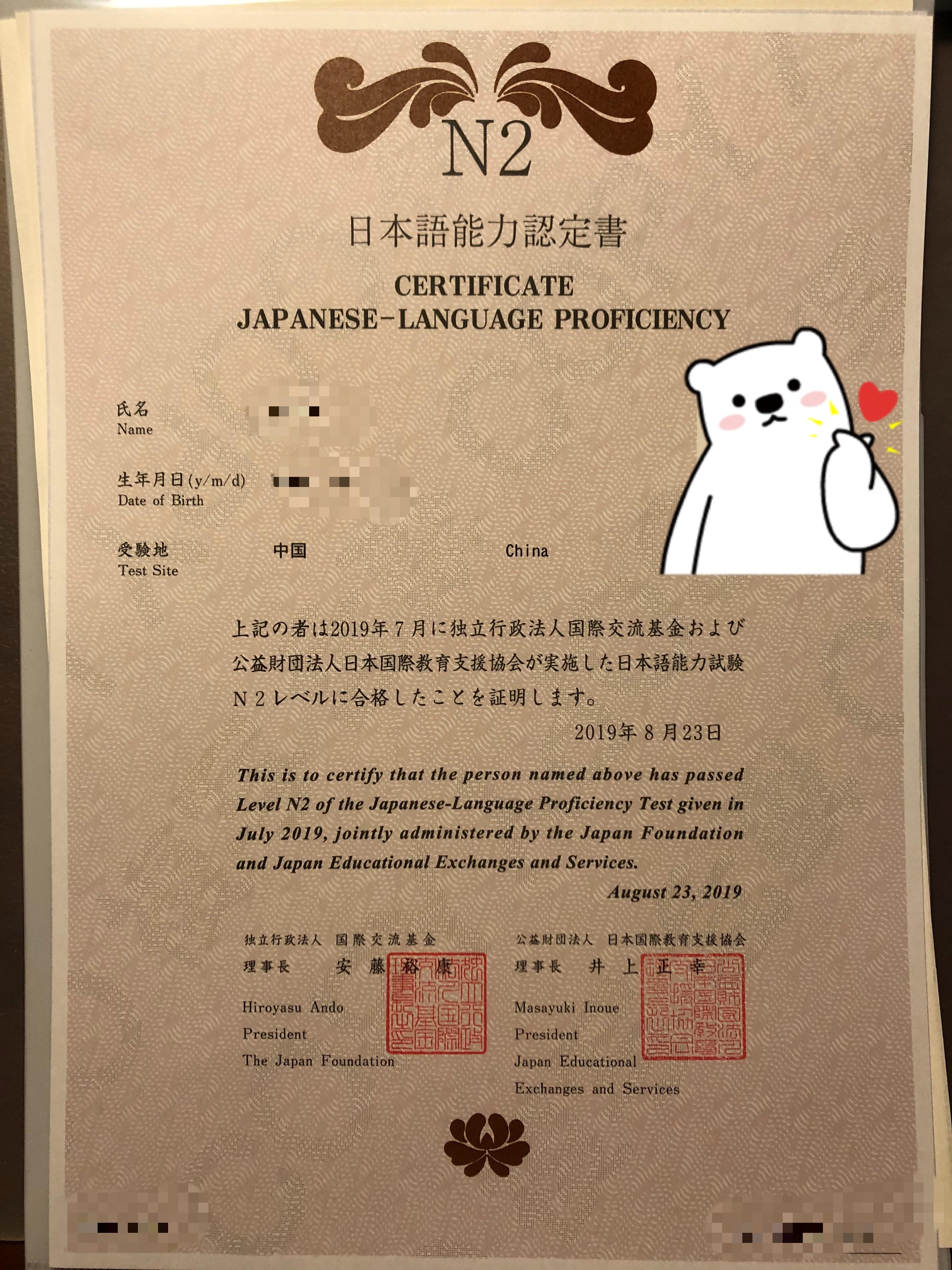
Thus, I became a certified person and could finally join a subtitle group.
It seemed that having a certificate gave me magical powers. When I clicked on the various anime and videos of my favorite Vtubers that I had sealed away for several months (since the summer before the start of my sophomore year), I found that I could understand about 80-90% of it, and I even felt that I could directly enter and do live broadcasts with the Vtubers.
So I gave up on the idea of joining a subtitle group because I initially thought it would improve my skills, but now that I met the requirements, I found that there didn't seem to be much ability left to improve.
Another reason was that I had made videos before and knew that making videos was a tough job, and I didn't want to spend too much time on that.
After this, I planned to continue learning Japanese. Although I gave up the opportunity for a second degree, I didn't plan to give up the opportunity to learn Japanese again.
Now, since I discovered the website カクヨム, it felt like I had found a treasure.
I personally like sci-fi, and there are so many free contents here. Hehehe!
I might write an article about this part in the future.
In summary, during this stage, I started reading Japanese novels.
For example, when Weathering With You was released, I bought the Japanese version of the original novel on Kindle to read.
Additionally: I watched Weathering With You with that cute girl mentioned earlier. w
(Because my boyfriend didn't accompany me)
Finally, I want to write here.
If I hadn't written this content today, I really wouldn't have known how much I experienced during my Japanese learning journey. Looking back, it was really super interesting. I truly am お可愛い子ですね (shameless).
The draft of this content was originally titled Some Experiences and Summaries of My Japanese Learning, but after writing so much, I changed it to the current title. This content indeed expresses my feelings.
This is the first time I have written such a long piece, recording my true feelings. If any big shots have more good methods, feel free to leave a message below.
I am not good at writing articles; I wrote this from 9 AM until the early morning of the next day. I hope that when friends quote this article, they can leave the original link; this is just a sincere request.
Also: Please don't criticize my handwriting.
Heartfelt words:
Learning a language is destined to be a tedious process, but please don't learn just for the sake of learning. The existence of language is meant to facilitate communication between people.
If you want to master a language, please make sure to learn with the goal of how to use it, rather than how to pass exams or memorize vocabulary and grammar.
I am not saying that vocabulary and grammar are not important, but they exist to help you express your thoughts smoothly and use a language more logically.
Please don't get it backward!
Because a person who can master a foreign language must have a lot of practice and often think about how to use that language to express their ideas.